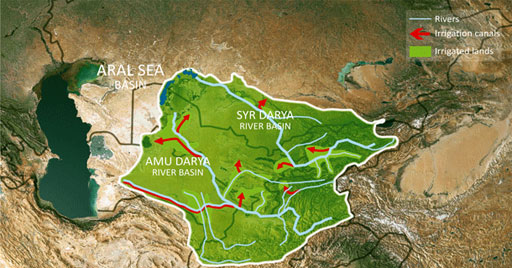ASHGABAT (Satrapia) — Acting as the President of the International Fund for Saving the Aral Sea (IFAS), the President of Turkmenistan Gurbanguly Berdimuhamedov appointed Guizgeldi Baidzhanov as Chairman of the Executive Committee of the organism. In this regard, Baydzhanov was relieved of his post as Deputy Minister of Agriculture and Water Resources of Turkmenistan for construction works.

- Aral Sea Basin
- Located in the heart of Central Asia, the Aral Sea Basin consists of the drainage area of the two major rivers, Amudarya and Syrdarya. The rivers descend from the slopes of the Tien Shan Mountains and the Pamirs. They run through Afghanistan, Tajikistan, Kyrgyzstan, Turkmenistan, Uzbekistan and Kazakhstan.
The International Fund for Saving the Aral Sea (IFAS) is an interstate organisation established in order to fund and credit joint regional environmental and research programmes and projects aimed at saving the Aral Sea and improving the environmental situation in the areas affected by the disaster as well as solving regional socio-economic problems.
On 20 March, 1997 a permanent executive and administrative body, the Executive Committee of IFAS (IFAS EC) was established in the city of Tashkent with branches in all the Central Asian states. The Executive Committee is a working body working for cooperation in the Region in the field of water resources and environmental management. Turkmenistan chairs the IFAS from 2017 to 2019.
Until 1960, the Aral Sea area was about 67,000 km² in size. This made the Aral Sea the world’s fourth largest inland water body. Now, the Aral Sea is not a single water body any more. Its northern part is separated by a dam and is sustained by the Syr Darya River. The remaining part is a residual water body with saline water. It comprises a shallow central part and a deeper narrow part stretching along the meridian of the Ustyurt Plateau escarpment.
Under the current conditions the Aral Sea cannot be restored to its former level. However, there is no doubt that greater efficiency in the use and management of water could significantly improve the situation and the trend towards a complete dry-out of the Aral Sea could be reversed.

